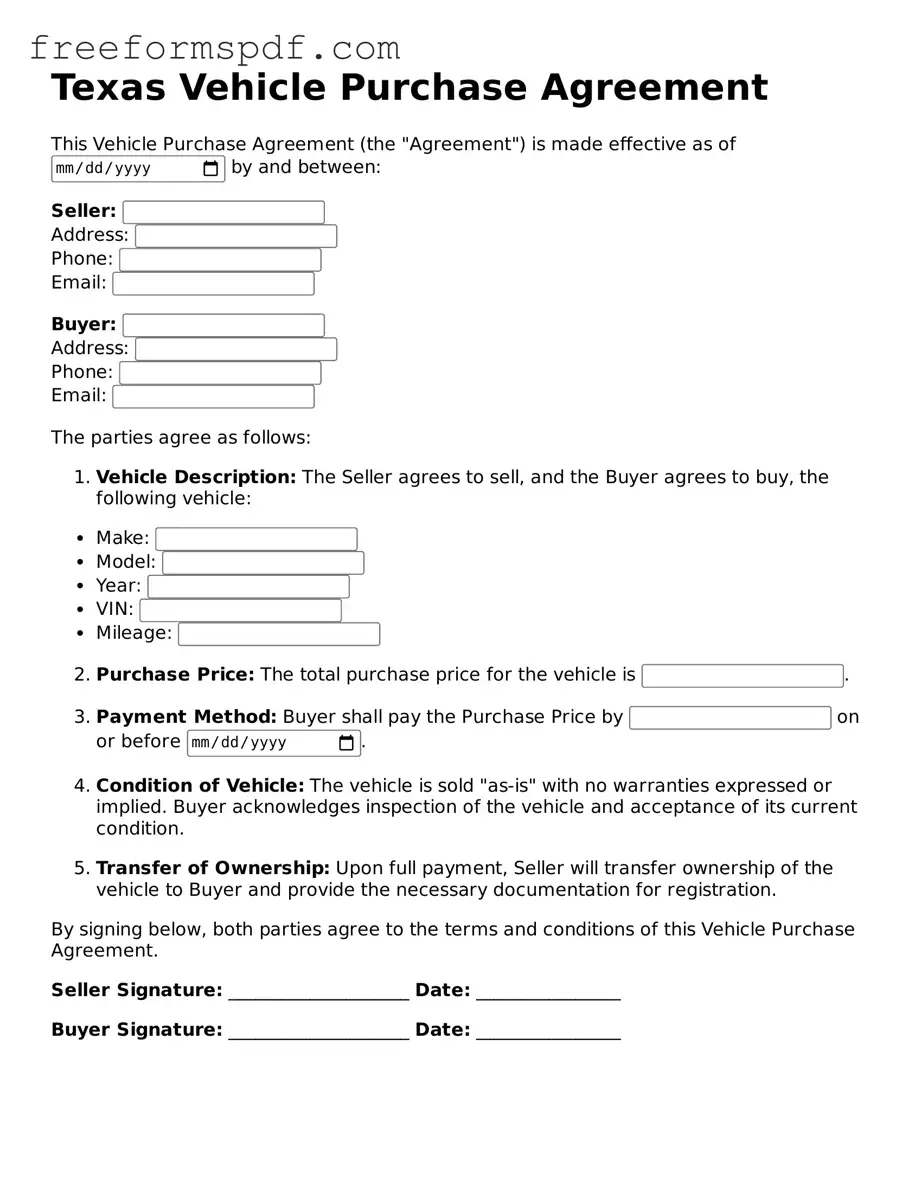Attorney-Verified Vehicle Purchase Agreement Document for Texas State
Common mistakes
-
Incomplete Information: Buyers often leave sections blank, such as the buyer's name, address, or vehicle details. This can lead to processing delays.
-
Incorrect Vehicle Identification Number (VIN): Mistakes in entering the VIN can cause significant issues. Always double-check this number against the vehicle's title or registration.
-
Failure to Sign: A common oversight is neglecting to sign the agreement. Without a signature, the document is not legally binding.
-
Missing Odometer Disclosure: Not providing the current mileage of the vehicle is a frequent error. This information is crucial for both parties.
-
Incorrect Purchase Price: Buyers sometimes miscalculate the total purchase price, including taxes and fees. This can lead to confusion at the time of payment.
-
Not Including Trade-In Details: If a trade-in is involved, failing to list it can complicate the transaction. Ensure all trade-in information is clearly stated.
-
Ignoring Financing Terms: If financing is being used, buyers may forget to include relevant details. This information is essential for the lender's records.
-
Not Keeping Copies: After completing the form, some buyers forget to make copies for their records. Keeping a copy is important for future reference.
Learn More on This Form
-
What is a Texas Vehicle Purchase Agreement?
A Texas Vehicle Purchase Agreement is a legal document that outlines the terms and conditions of the sale of a vehicle in Texas. It serves as a contract between the buyer and the seller, detailing important information such as the vehicle's description, purchase price, and any warranties or conditions associated with the sale.
-
Why is it important to have a Vehicle Purchase Agreement?
This agreement protects both parties involved in the transaction. For the buyer, it provides proof of purchase and can help resolve disputes regarding the vehicle's condition or ownership. For the seller, it serves as evidence that the vehicle has been sold and can limit liability for future issues related to the vehicle.
-
What information should be included in the agreement?
The Vehicle Purchase Agreement should include:
- The names and addresses of both the buyer and the seller.
- The vehicle identification number (VIN), make, model, and year of the vehicle.
- The purchase price and payment method.
- Any warranties or guarantees provided by the seller.
- Signatures of both parties.
-
Is the Vehicle Purchase Agreement required by law?
While a Vehicle Purchase Agreement is not legally required in Texas, it is highly recommended. Having a written agreement helps clarify the terms of the sale and provides legal protection for both parties. It can also facilitate the transfer of title and registration with the Texas Department of Motor Vehicles.
-
Can I modify the Vehicle Purchase Agreement?
Yes, the Vehicle Purchase Agreement can be modified to suit the needs of both the buyer and the seller. However, any changes should be clearly documented and agreed upon by both parties. It's advisable to initial any modifications to ensure that both parties acknowledge and accept the changes.
-
What should I do if there is a dispute regarding the agreement?
If a dispute arises, the first step is to communicate with the other party to try to resolve the issue amicably. If that fails, mediation or arbitration may be options to consider. In some cases, legal action may be necessary. Consulting with a legal professional can provide guidance on the best course of action based on the specifics of the situation.
Misconceptions
The Texas Vehicle Purchase Agreement form is an important document in the vehicle buying process. However, several misconceptions exist regarding its use and implications. The following list clarifies these misunderstandings.
- Misconception 1: The form is only necessary for private sales.
- Misconception 2: The form is not legally binding.
- Misconception 3: It can be altered after signing.
- Misconception 4: The form guarantees financing approval.
- Misconception 5: The form does not require a witness or notarization.
- Misconception 6: The Vehicle Purchase Agreement is the same as a title transfer.
- Misconception 7: It only protects the seller.
- Misconception 8: Once signed, the buyer cannot back out of the deal.
This is incorrect. The Vehicle Purchase Agreement is required for both private sales and transactions through dealerships to ensure clarity and legal protection for both parties.
In fact, the Vehicle Purchase Agreement is a legally binding document once signed by both parties, outlining the terms of the sale and protecting the rights of each party.
Once the form is signed, any changes require mutual consent from both parties. Unilateral changes may not be enforceable.
This is false. The Vehicle Purchase Agreement does not guarantee financing; it simply outlines the terms of the sale. Financing must be approved separately by the lender.
While not always necessary, having a witness or notarization can add an extra layer of security and legitimacy to the agreement.
This is misleading. The Vehicle Purchase Agreement documents the sale, while the title transfer is a separate process that officially changes ownership with the state.
On the contrary, the form protects both the buyer and the seller by clearly outlining the terms of the sale, including payment details and vehicle condition.
While the agreement is binding, certain circumstances, such as misrepresentation or undisclosed issues with the vehicle, may allow the buyer to rescind the agreement.
